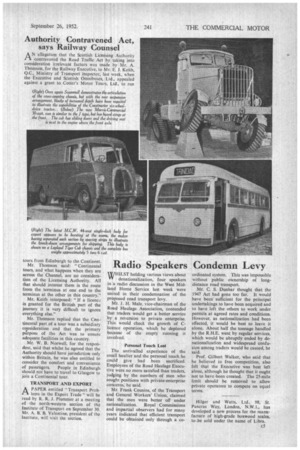Radio Speakers Condemn Levy
Page 71

If you've noticed an error in this article please click here to report it so we can fix it.
WHILST holding various views about denationalization, four speakers in a radio discussion in the Wost Midland Home Service last week were united in their condemnation of the proposed road transport levy.
Mr. J. H. Male, vice-chairman of the Road Haulage Association, contended that traders would get a better service by a reversion to private enterprise. This would check the growth of Clicence operation, which he deplored because of the empty running it involved.
Personal Touch Lost The unrivalled experience of the small haulier and the personal touch he could give had been sacrificed. Employees of the Road Haulage Executive were no more satisfied than traders, judging by the numbers of men who sought positions with private-enterprise concerns, he said.
Mr. Frank Cousins, of the Transport and General Workers' Union, claimed that the men were better off under nationalization. Royal Commissions and impartial observers had for many years indicated that efficient transport could be obtained only through a co ordinated system. This was impossible without public ownership of longdistance road transport.
Mr. C. S. Dunbar thought that the 1947 Act had gone too far. It would have been sufficient for the principal undertakings to have been acquired and to have left the others to work under permits at agreed rates and conditions. However, as nationalization had been effected, it would be best to leave it alone. About half the tonnage handled by the R.H.E. went by regular services, which would be abruptly ended by denationalization and widespread confusion among traders would be caused, he said.
Prof. Gilbert Walker, who said that he believed in free competition, also felt that the Executive was best left alone, although he thought that it ought not to have been created. The 25-mile limit should be removed to allow private operators to compete on equal terms.
Hilger and Watts, Ltd., 98, St. Pancras Way, London, N.W.I., has developed a new process for the manufacture of high-grade boxwood scales, to be sold under the name of Libra.




































































































































































































































































































